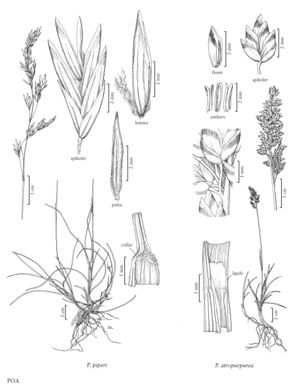Difference between revisions of "Poa atropurpurea"
imported>Volume Importer |
imported>Volume Importer |
||
| (One intermediate revision by the same user not shown) | |||
| Line 43: | Line 43: | ||
|publication year= | |publication year= | ||
|special status=Endemic | |special status=Endemic | ||
| − | |source xml=https:// | + | |source xml=https://bitbucket.org/aafc-mbb/fna-data-curation/src/200273ad09963decb8fc72550212de541d86569d/coarse_grained_fna_xml/V24/V24_775.xml |
|subfamily=Poaceae subfam. Pooideae | |subfamily=Poaceae subfam. Pooideae | ||
|tribe=Poaceae tribe Poeae | |tribe=Poaceae tribe Poeae | ||
Latest revision as of 16:25, 11 May 2021
Plants perennial; loosely tufted, rhizomatous. Basal branching extra- and intravaginal. Culms 10-55 cm, erect or the bases decumbent, terete or weakly compressed; nodes terete, not exserted. Sheaths closed for about 1/3 their length, terete, smooth, glabrous, bases of basal sheaths glabrous, distal sheath lengths 1.5-7.5 times blade lengths; collars smooth, glabrous; ligules 1-2 mm, smooth or sparsely scabrous, apices truncate to obtuse; innovation blades similar to the cauline blades, adaxial surfaces nearly smooth, glabrous on and between the veins; cauline blades fairly strongly reduced in length distally, 1-3 mm wide, folded to involute, moderately thick, moderately firm, abaxial surfaces smooth, apices narrowly prow-shaped, flag leaf blades 1-5.5 cm. Panicles 3-7 cm, erect, lanceoloid to ovoid, congested, with 20-70 spikelets; nodes with 1-2 branches; branches 0.5-3 cm, erect, terete, usually smooth, infrequently sparsely scabrous distally, with 3-12 spikelets. Spikelets 3.5-5.5 mm, lengths to 3 times widths, laterally compressed, very compact, not sexually dimorphic; florets 2-5; rachilla internodes about 0.5 mm, smooth, glabrous. Glumes broadly lanceolate, distinctly shorter than the adjacent lemmas, distinctly keeled, keels smooth or sparsely scabrous; lower glumes 3-veined; calluses glabrous; lemmas 2.5-3.5 mm, lanceolate, usually purplish, distinctly keeled, glabrous, smooth, margins glabrous, apices acute; palea keels scabrous, intercostal regions glabrous; anthers vestigial (0.1-0.2 mm) or 1.5-2 mm. 2n = 28.
Discussion
Poa atropurpurea is a rare dioecious endemic of mesic upland meadows in southern California. It is federally listed as endangered.
Selected References
None.
